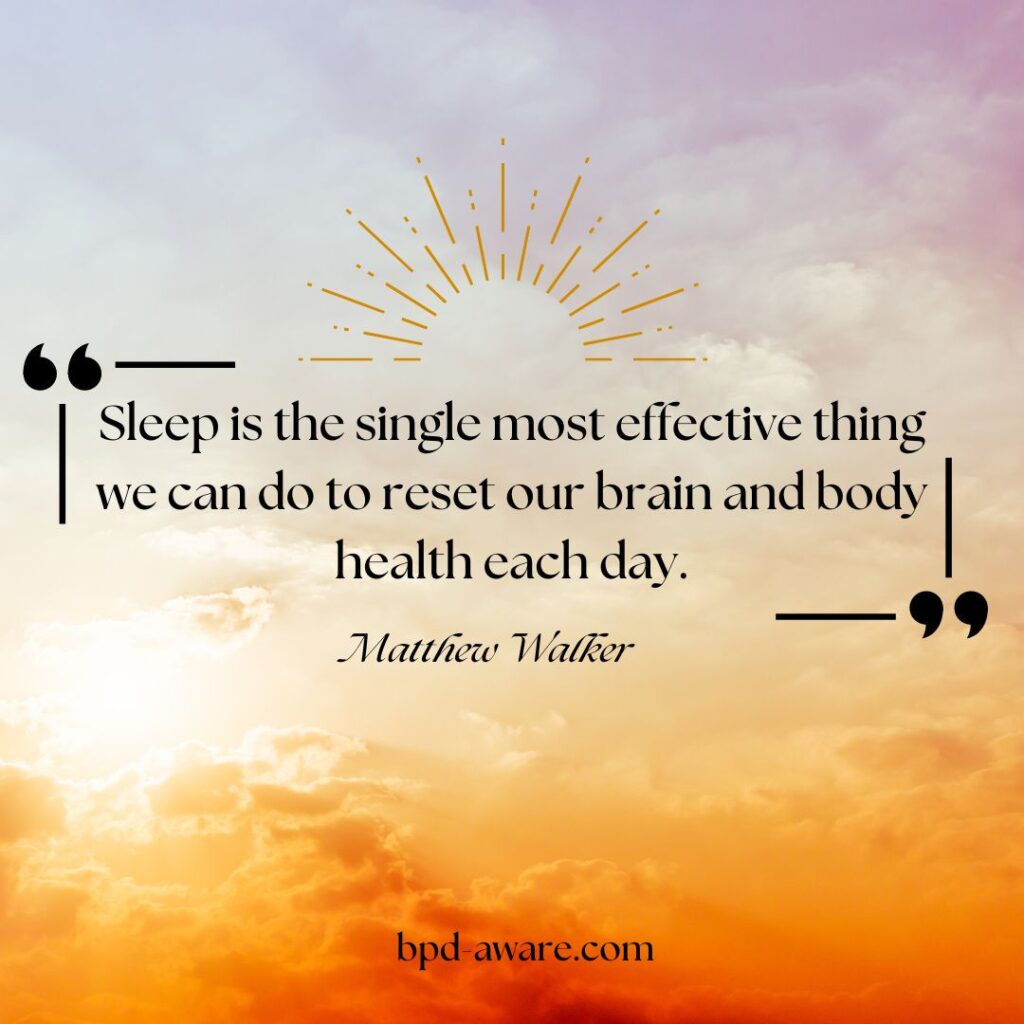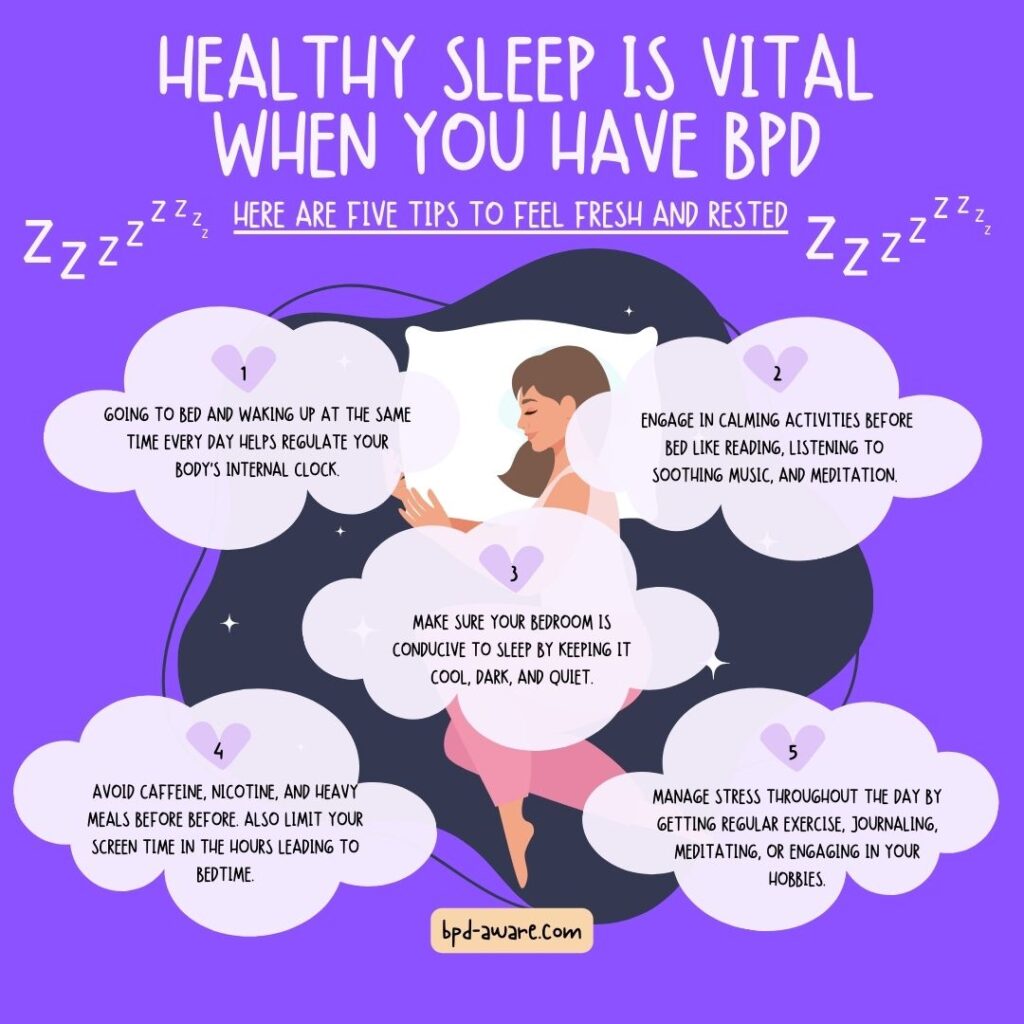Borderline Personality Disorder (BPD) is a complex issue that can cause big swings in mood, a shaky sense of self, fear of abandonment, dissociation, troubled relationships, and many more problems. One such problem, one which isn’t discussed much, is the link between BPD and poor sleep.
Sleep is crucial for good health but gets little attention when talking about BPD. For people dealing with BPD, getting a good night’s sleep can be hard. They often face nights where they struggle to fall asleep as they can’t stop ruminating about the day behind them, have their sleep disturbed by anxiety attacks or nightmares, or simply can’t fall asleep at all. The connection between BPD and sleep problems is clear and important to look into.
In this article, we explore how BPD and sleep issues are connected. We look into how BPD affects sleep, studying the mind, brain, and behavior factors involved. We also highlight how important it is to focus on getting good quality sleep when managing BPD.
Going through the relationship between BPD and sleep disturbances shows us not just the complex nature of BPD but also ways to better help and support those dealing with these two hard challenges. By paying more attention to sleep issues in BPD, we hope to build more understanding, care, and better help for those struggling.
The Importance of Sleep
Quality sleep is important for physical and mental health. It helps with thinking, memory, learning, and managing emotions. Not getting enough sleep can mess with these abilities, making it hard to focus, make good choices, or remember the events of the day.
Sleep also helps control emotions. It lets the brain process feelings so we can handle them better. If we don’t sleep well, it can lead to problems managing our moods, making us more likely to feel anxious, depressed, or upset.
Besides helping the mind, sleep is so important for the body. It boosts the immune system, making it easier to fight off sickness. Lack of sleep can lead to more colds, inflammation, and serious health issues like heart disease, diabetes, and weight gain. Sleep also helps balance hormones that control hunger and the body’s energy use. Your body repairs itself while you sleep, so poor sleep can lead to aches and pains when your body struggles to repair the day-to-day damage you do. These aches and pains can make it more difficult to control your emotions, it’s hard to be in a good mood when you’re in physical pain.
People with BPD often have a hard time sleeping. They may have difficulty falling asleep asleep, staying asleep, or feeling rested after sleeping. This can make BPD symptoms worse, like mood swings, being impulsive, and having problems in relationships. Not sleeping enough can also make emotions more intense, mess with how well they think, and make mood issues more severe. That’s why it’s essential to deal with sleep problems when treating BPD.

How BPD Causes Problems with Sleep
One key sign of BPD is how strong and quick emotions can change, from deep sadness to high joy in a short time. These intense feelings often keep going into the night, making it hard to calm the mind and get good sleep. Thoughts that won’t stop, ruminating over things again and again, and feeling too wound up can make it take longer to fall asleep and keep sleep from being smooth.
The big fear of being left alone, which is often at the heart of BPD, can show up during sleep, making someone always on the lookout for problems within their relationships. People with BPD might wake up a lot at night, without really knowing why, checking if they’re still okay or if someone has messaged them. This need to always be alert can stop them from getting into the deep, healing kind of sleep, keeping the cycle of not sleeping well going.
Impulsiveness, another part of BPD, can show in ways that mess with sleep. Doing things without thinking, like using drugs, eating a lot all at once, or spending too much money, can directly make sleep worse and make any existing sleep problems bigger. Also, making rash choices at night can lead to disturbed sleep habits, such as sleeping and waking up at the same time or staying away from things that wake you up before bed.
Black-and-white thinking can also really affect sleep. People with BPD might have fights or feel very upset during the day, and these issues can keep going into the night in their thoughts and dreams. This inner upset can make sleep choppy, leading to more waking up at night and having anxiety dreams, or nightmares a lot.
Anxiety and depression are common comorbidities in people with BPD and can deeply change how someone sleeps. Being very anxious can cause thoughts to race, make it hard to stay still, and make you feel shaky, all of which make it tough to relax enough to start sleeping. In the same way, feeling depressed, like nothing matters, can lead to trouble sleeping, including not being able to sleep or sleeping too much. Too much sleep can be as detrimental as not sleeping enough.
In short, the deep and complex issues of BPD, like intense feelings, fear of being left, acting on impulse, seeing things in black and white, feeling anxious, and feeling sad, all come together to make sleeping well hard. To help people with BPD who have disturbed sleep patterns, it’s important to tackle these deeper issues.
How To Improve The Quality of Your Sleep
For people with BPD, sleeping well can be difficult. But, with the proper steps and a holistic approach, better sleep is within reach. Here’s several ways someone with BPD can improve their quality of sleep.
Stick to a Consistent Sleep Schedule: Sleep and wake at the same time every day, even on weekends. This helps set your body’s clock, making it easier to doze off and wake up fresh.
Create a Sleep-Friendly Environment: Keep your sleeping space cool, dark, and quiet. A comfy mattress and pillows are key. Blackout curtains or white noise machines can block out light and sound. Eye masks and noise-blocking headphones might also help.
Cut Down on Stimulants and Screens: Stay away from caffeine and nicotine before bed, as they can keep you awake. Also, limit using phones, computers, and TVs an hour before sleep. Blue light emitted by electronic devices can mess with your sleep cycle.
Establish a Relaxing Bedtime Routine: Do relaxing things before bed to tell your body it’s time to slow down. You could read, take a warm bath, try deep breathing or meditation, or listen to calm music.
Eat Light and Limit Alcohol: Big meals or alcohol right before sleeping can mess with your sleep by causing discomfort or reflux. If you’re hungry, eat a small snack, and try to drink less alcohol, as it can make your sleep worse. Alcohol, in general, is a bad idea for your health, especially when you have BPD, so you may want to cut it out entirely.
Exercise Regularly: Being physically active helps you fall asleep more quickly and improves the quality of your sleep. Try to get 30 minutes of exercise most days, but don’t do intense workouts right before bed, as they might make you too energized to sleep.
Manage Stress: Feeling stressed can make it difficult to fall asleep, so it helps to find good ways to ease stress every day. Try calm exercises like being mindful or doing yoga, writing down thoughts, or getting help from a talk therapist.
Tackle Other Sleep Issues: If you have BPD, comorbid sleep disorders like insomnia or restless legs syndrome can further exacerbate sleep disturbances. It’s important to get such issues evaluated and seek help. Cognitive-Behavioral Therapy for insomnia (CBT-I) works well for people with BPD. It teaches how to think and act differently around sleep.
Work on other mental health problems like depression and anxiety, as improving these can make sleep better too. Working with mental health professionals to make a plan tailored for you can help improve sleep and handle symptoms.
Try Natural Sleep Aids: While prescription medications may be appropriate in some cases, natural sleep aids offer alternative options for individuals seeking gentle, non-habit-forming solutions. Things like valerian root, chamomile, and lavender can help you relax and sleep better. Melatonin, the hormone that preps you for sleep, can also be purchased over the counter. But be careful and talk to a doctor before using any of these, especially if you’re already taking other medicines or have health issues.

Final Thoughts
Those with BPD might find it hard to fall asleep, may wake up often, or have very real-feeling bad dreams. But it’s important to remember that good sleep is vital to staying healthy, thinking straight, handling emotions, fighting off sickness, and feeling strong.
Getting better sleep can help make BPD symptoms less intense and make life better. And the good news is that there are ways to sleep better, like sticking to a bedtime routine, relaxing before bed, and fixing other sleep issues. With effort, support, and maybe a little help, people with BPD can sleep well.
In short, let us not underestimate the power of sleep in the realm of mental health. Sometimes a good night’s rest is the best medicine of all.
Sources, Resources, and Further Reading
- Sleep Patterns in Borderline Personality Disorder: https://www.psychiatrictimes.com/view/sleep-patterns-in-borderline-personality-disorder
- Treating Insomnia May Be Important for Borderline Personality Disorder: https://www.verywellhealth.com/insomnia-may-worsen-borderline-personality-disorder-5119313
- Chronic Sleep Disturbances and Borderline Personality Disorder Symptoms: https://pmc.ncbi.nlm.nih.gov/articles/PMC4129646/
- A Consistent Sleep Schedule to Save Lives in Borderline Personality Disorder: https://www.honestsleep.com/blog/a-consistent-sleep-schedule-to-save-lives-in-borderline-personality-disorder
- Understanding the Relationship Between Sleep Problems in Early Childhood and Borderline Personality Disorder: A Narrative Review: https://www.dovepress.com/understanding-the-relationship-between-sleep-problems-in-early-childho-peer-reviewed-fulltext-article-NSS
















